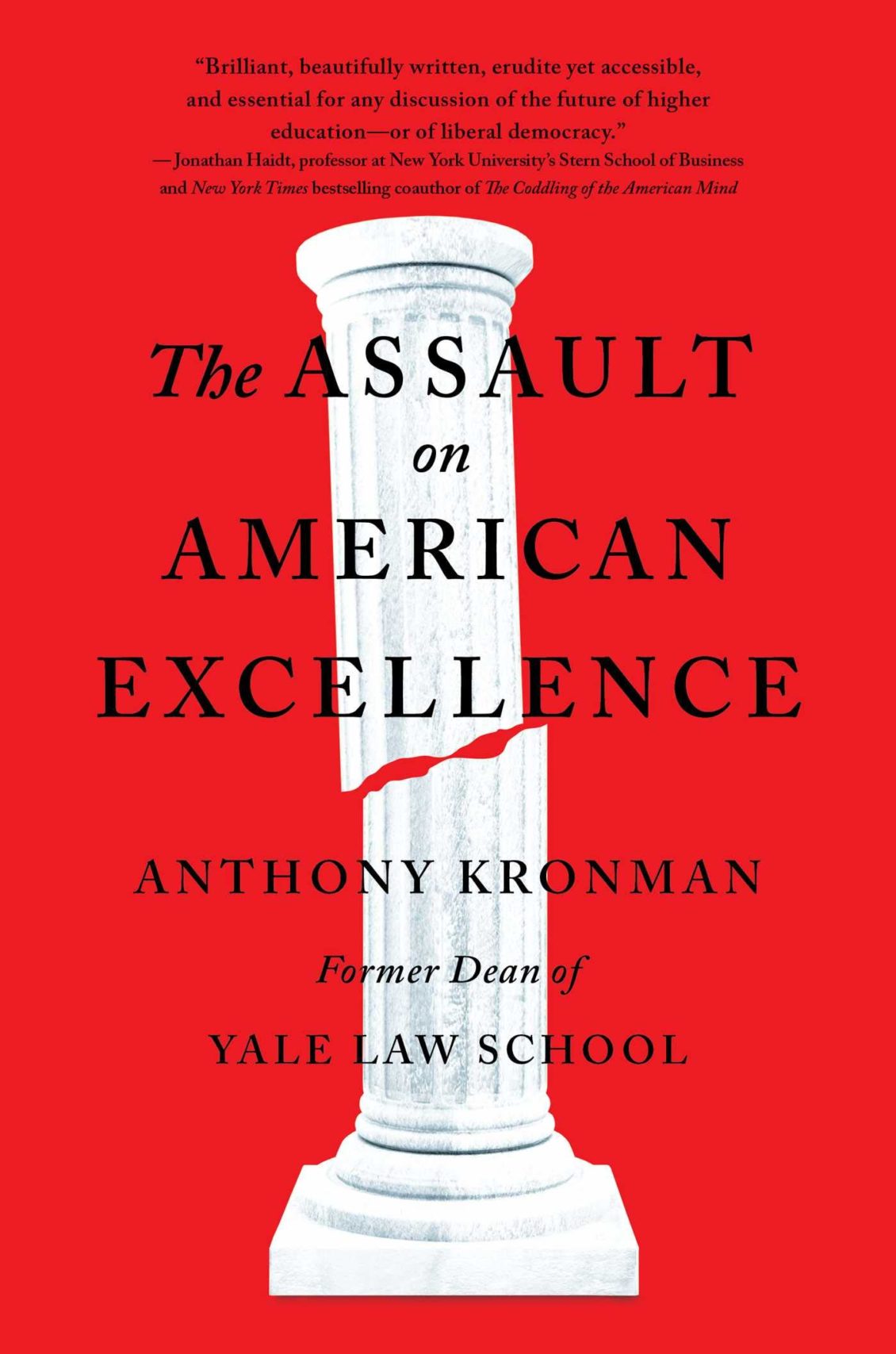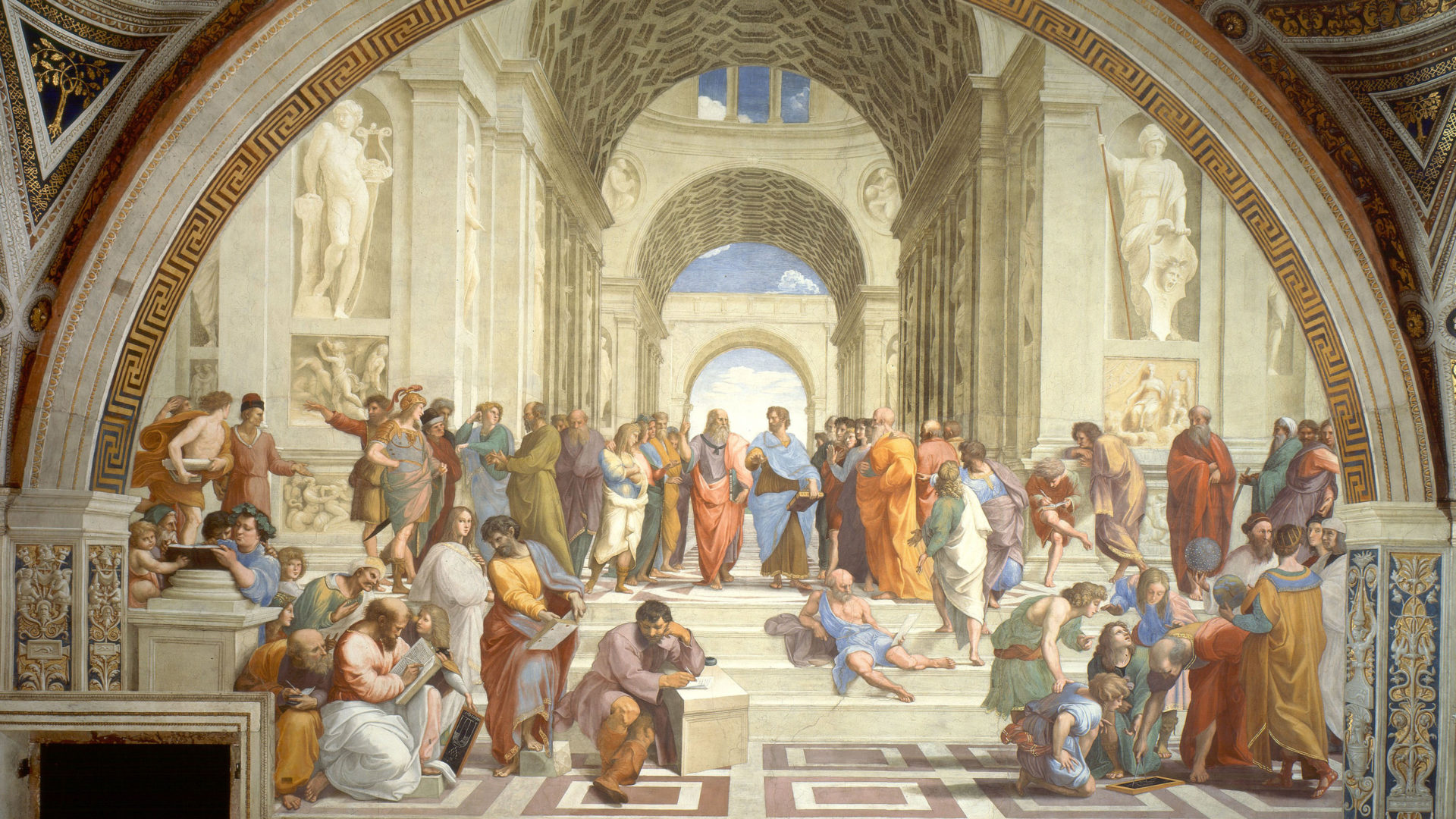When I first read an essay by Anthony Kronman excerpted from his new book The Assault on American Excellence in the Wall Street Journal, I immediately drafted a letter to the editor to point out that a key word missing from the author’s well-argued case against the insidious effects of our current notion of diversity is “knowledge,” which can only accrue from years and decades of solitary reading and contemplation, not just the kinds of Socratic arguments and analyses that might take place in an advanced undergraduate course or graduate seminar. I have now read the whole book and wish the author had spent more time explaining what an aristocratic ideal in education might look like in a troubled capitalist society instead of adding his voice to the growing chorus of conservative and libertarian thinkers decrying the rise of a grievance culture on American college and university campuses. What makes Kronman’s book stand out is precisely his unapologetic championing of a conservative university whose mission is to nurture the potential for human excellence in students and challenge them to enlarge the scope of their minds, tolerate ambiguity, and use reason (not emotion) in all their intellectual engagements.

Given the author’s beliefs, it is no wonder that he finds the rise of diversity with its own speech codes not just unacceptable in such an academic setting, but actually quite injurious to America’s democratic system. He joins authors like Heather MacDonald who have pointed out to the expanding army of officials overseeing diversity and inclusion programs that are costing universities hundreds of millions of dollars and branding anyone who dares question this agenda as a bigot. This notion of diversity seems to be the inadvertent outcome of a Supreme Court decision in the case of Regents of the University of California v. Bakke, when a white man, Allan Bakke, sued the University of California at Davis for denying him admission to its medical school because of the university’s preferential treatment of certain minority applicants. The Supreme Court was divided on the matter, but it was Justice Lewis F. Powell Jr. who broke the stalemate by arguing that Davis could not use reverse discrimination as an education tool, only a diversity that enhances the academic experience of the students. This fateful decision, handed down in 1978, is, Kronman argues, at the root of the current obsession with diversity on college campuses. It does nothing to compensate the victims of historical injustices, but leads to insidious dishonesty in the application process (everyone knows the reasons for affirmative action), undermines the aristocratic ideal of attaining originality in one’s chosen field, and works against the venerable tradition of American individualism by casting all occupants of a university campus into a pre-determined social group. Needless to repeat, again, that this state of affairs is not only ruinous for the humanities, but to all the sciences as well. It prevents students from aspiring for human excellence that is akin to religious faith. To be closer to God, one has to go beyond the minor idiosyncrasies of skin color, national origin, gender–what the philosopher John Rawls, in his Theory of Justice, called the “veil of ignorance.” These attributes have no moral worth; it is only by liberating ourselves from them that we can soar to the heights of our possibilities.
Appealing to one’s skin color, gender, or private experience as a source of authority in an academic setting reduces the students’ ability to look at history with what Hannah Arendt called an “enlarged mentality.” Among other things, the students begin to call for removing offending monuments and renaming buildings, like the residential college in Yale named after John Calhoun.
At first, Yale’s president made the case for keeping the name, but then when protests grew, he buckled and formed a Committee to Establish Principles on Renaming, whose job was to determine Calhoun’s “principal legacy” and whether such legacy conflicts with Yale’s mission statement, which was drafted only in 1992. The Committee decided that the “principal legacy” of John Calhoun, an ardent defender of “the spirit of republicanism” with a “Jeffersonian fear of centralized government,” the author of A Disquisition on Government, “which does not mention slavery once”— albeit he was committed to preserving Southern culture, including the institution of slavery, and protecting it from the hegemonic North—was one of “racism and bigotry.” No one thought of recalling the reason why the Yale Corporation chose to name a building for him in 1930, not as a defender of slavery, but as a “most eminent” graduate “in the field of Civil State.” As (political) times changed in the course of the 20th and 21st centuries, the “most eminent” scholar was reduced to his racist views and his name was struck from the building. One wonders whether Jonathan Edwards and Benjamin Franklin, whose names grace two of Yale’s fourteen residential colleges, would be next. How about the name of the university itself, since Eli Yale himself “participated profitably in the slave trade”? Someone should tell students that the pyramids, palaces, and cathedrals that attract hundreds of millions of tourists every year around the world are all monuments to the exploitation of defenseless, poor people and the persecution of the unorthodox. “There is no document of civilization,” Walter Benjamin once wrote, “which is not at the same time a document of barbarism.”
Kronman, who learned to appreciate a “reverence for human excellence” while studying the great books as an undergraduate student at Williams College and has been teaching law and the humanities for forty years, could have given us a more concrete idea what his ideal, aristocratic scholar would look like today. For him, the “aristocratic ideal” is best attained through a well-organized education in the humanities. This is, in fact, an old American idea. John Adams was wary of absolutist democratic impulses without monarchical or aristocratic checks because knowledge and culture can only be preserved within their precincts. After only a visit of nine months in 1831, the French aristocrat Alexis de Tocqueville was able to put his finger on the pulse of the new American democracy as no other observer has ever done. He noticed the Americans’ utilitarian spirit which, paradoxically, degrades them even as it improves their living conditions. He believed that a “few excellent universities” could be entrusted with this task the kind of education that will ennoble its elite. That, it turned out, was a futile wish.
No one was able to better see through the failure of American universities than H. L. Mencken who, in an essay titled “The National Letters,” published in 1919, blamed the poverty of American literature on “the lack of a civilized aristocracy, secure in its position, animated by an intelligent curiosity, skeptical of all facile generalizations, superior to the sentimentality of the mob, and delighting in the battle of ideas for its own sake.” This aristocracy is “the class that organizes danger to the service of the race; it pays for its high prerogatives by standing in the forefront of the fray.” This is especially important because “the whole drift of our law is toward the absolute prohibition of all ideas that diverge in the slightest form from the accepted platitudes” and a national philosophy that “erects conformity into the noblest of virtues and the free functioning of personality into a capital crime against society.”
For Mencken, Puritanism and “the old democratic veneration for mere schooling” has produced professors who yield “to the prevailing correctness of thought in all departments . . . and is, in fact, the chief exponent among us of the democratic doctrine that heresy is not only a mistake, but also a crime.” This is a colossal betrayal for Mencken since distinguished professors like Harvard’s Irvin Babbitt’s work lacks “intellectual audacity” and is merely a “solemn, highly judicial, coroner’s inquest.” Damning words for the author of Literature and the American College Life, a sure proponent of a “humanistic” culture and who also believed in an education that produces “high and objective standards of human excellence.” But for Mencken, this “literary Brahmin” could only produce work with “a faint perfume of college-town society.”
Things haven’t gotten better since Mencken’s condemnation of higher education. Colleges and universities today prize what Kronman calls the “vocational ideal” and the pursuit of careers. To make a case for the humanities, university presidents usually resort to instrumental arguments, like when they say that employers seek workers capable of critical thinking and good communications skills. Yet it is this “vocational ideal” that is the “most powerful enemy of aristocratic belief that American higher education has ever known.” Kronman rightly believes that one could be democratic and egalitarian in society (he himself was a student activist opposed to the Vietnam War), but resolutely aristocratic within the academy. One must advocate for equality in one sphere and nobility in another. That, in any case, is Kronman’s notion of the true “American ideal.”
One of the arguments in The Assault on Excellence is the author’s insistent attempt to sever the university from the larger polis it inhabits. Even if we assume that universities are financed by some magical endowment unattached the wheeling and dealing outside their walls, one might argue that the reason American universities have become deadly rings for righting historical and social wrongs is that the options for doing so in the larger political realm have all but vanished. The average citizen is not reading Karl Marx, Simone de Beauvoir, or Frantz Fanon; he or she is trying to pay bills and stay healthy. Similarly, one could bemoan the vocational nature of American colleges and universities, but to expect the latter to shape excellent souls is to invest these institutions with god-like powers. With very few exceptions (if any), university leaders are in a mad race for survival and financial security, even as they still extol the virtues of a liberal arts education. Sometimes Kronman falls into the solipsistic trap that irks many members of minority groups. When he says that the aristocratic spirit is vital to democracy and “our civilization,” he gives ammunition to those minorities whose ancestors experienced the West as a ruthless, murderous entity. After all, skin color, gender, and sexual orientation are reminders of this sordid history. And if this civilization is fueled by a ruthless economic system that courses through history and society like a hurricane, then it would be myopic to expect the university not to be affected by it in a major way.
The American university would not exist today if it weren’t fed by student debt and the profits of capital. The aristocratic ideal seems like a luxurious indulgence when the major leitmotif of higher education these days is the return on investment. And how about the vanishing attention spans of people who are increasingly unable to be alone with books for long periods of time? As Silicon Valley is remaking the world in its own image, it has given rise to new masters—rich businessmen and women who anoint books and their authors in shows and websites and pundits who use podcasts to reach those who find no sustenance in older educational channels. The philosophy or literature professor who spends decades with books has become, for all intents and purposes, an extinct species.
It’s quite possible that, in our bright new world of shiny gadgets, the human excellence that is so essential to guarding against the tyranny of majorities and safeguarding our embattled democracy could, like some ancient mystical order, only survive in an underground setting. It would be quite a gift if Kronman turned his whole attention to thinking about this urgent question and showed us how to keep the aristocratic ideal alive in our 21st-century civilization and beyond.





Comments are moderated by the editor and may not appear on this discussion until they have been reviewed and deemed appropriate for posting. All information collected is handled in a manner consistent with our privacy policy.